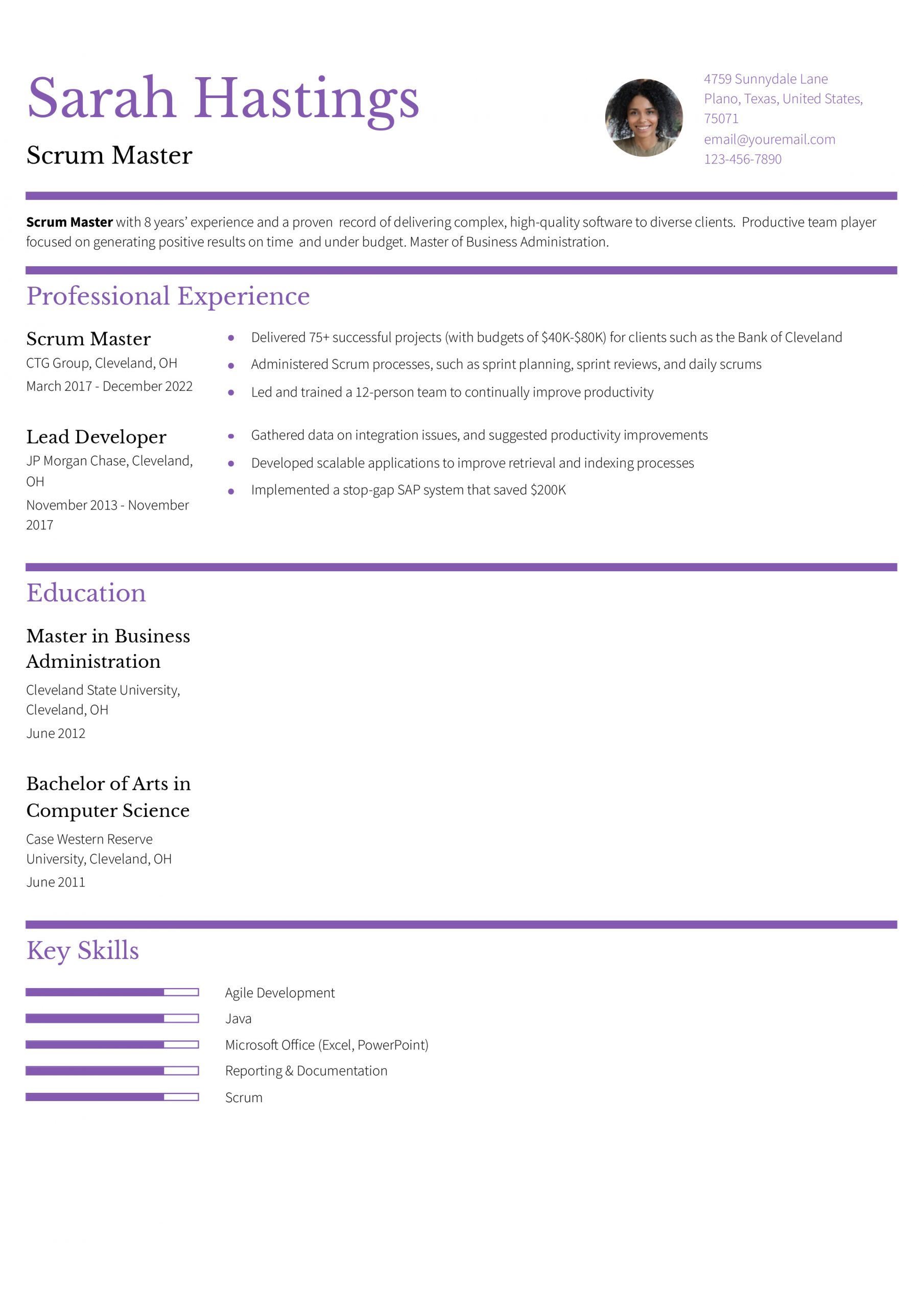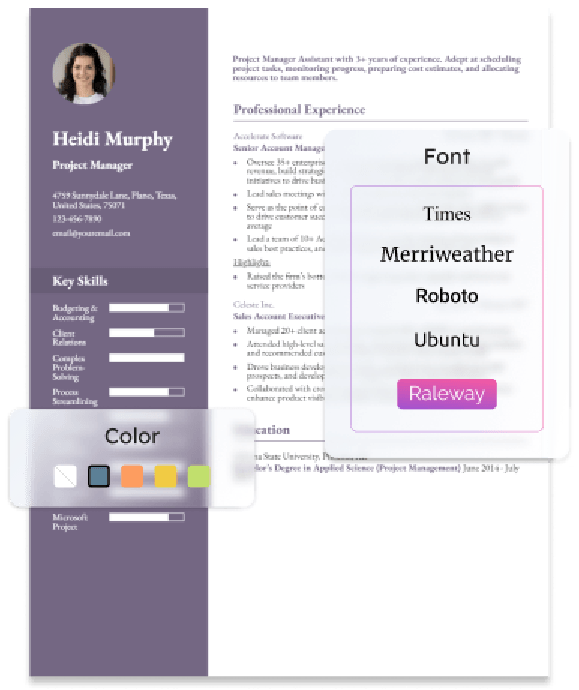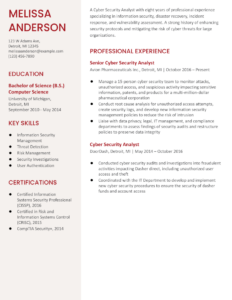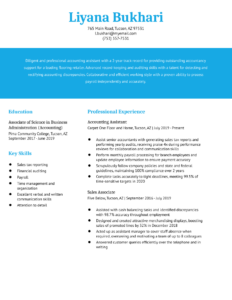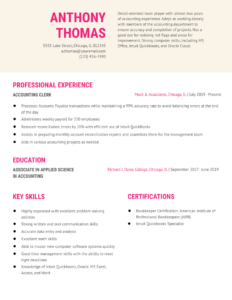How to Write a Scrum Master Resume
To write a good scrum master resume, you’ll need to show you can guide complex team projects in a fast-paced setting. The tips and examples below will help you capture this skill on your resume so it gets you interviews for your next scrum master job.
- Entry-Level
- Mid-Career
- Senior-Level
1. Craft an outstanding profile with a summary of your scrum master qualifications
The Profile section is your chance to make a strong first impression on a hiring manager. It should quickly highlight your strengths and show why you fit the job. Try including keywords from the job posting that overlap with your background – these may include relevant software programs, roadmap planning, or risk mitigation. You should also list your years of experience and any education or certifications that make you a standout candidate.
Senior-Level Profile Example
Scrum Master with 15 years of experience and a reputation for surpassing expectations. Firm grasp of proposal development, agile frameworks, infrastructure development, risk mitigation planning, and security planning. Draw on Master’s in Computing and Business.
Entry-Level Profile Example
Energetic Scrum Master with more than a year of experience leading and supporting Agile teams. Skilled at scheduling and directing daily scrums to ensure their effectiveness. Natural problem-solver who identifies barriers to progress and finds solutions to keep teams on track.
2. Create a powerful list of your scrum master experience
Use the Experience section to show how you’ve helped maintain team focus and drive sophisticated projects. For each job in your recent work history, provide your title, employer, location, and employment dates. Brainstorm your primary duties or highlights in the position, then filter out any that don’t speak to your target scrum master job. Quantify your impact by giving numbers such as how much your team increased revenue or decreased product delivery times.
Senior-Level Professional Experience Example
Scrum Master
General Dynamics Information Technology, Cape May, NJ | October 2012-Present
- Led 2 cross-functional scrum teams to increase revenue by $1M in 3 years
- Introduced Kanban system that decreased product delivery time by 22%
- Trained 3 new scrum masters
- Evaluated architecture design across the company
Entry-Level Professional Experience Example
Scrum Master
CTG, Honolulu, HI | May 2019-Present
- Collaborate with product owner to set goals for each project
- Create and monitor daily targets for each team member
- Advocate scrum values and motivate team members
- Provide ongoing professional development on organizational skills and Agile best practices
3. Include your scrum manager-related education and certifications
An advanced degree or certification shows employers you’ve dedicated yourself to the industry and have the knowledge to excel at their company. Your resume’s Education section should name your degree, school, and location. You may also want to specify your major or individual courses if they overlap with your target job. When listing any licenses or certificates, it’s a good idea to include the awarding organization, especially if it’s well known.
Certifications
Template
- [Certification Name], [Awarding Organization], [Completion Year]
Example
- Certified Professional Scrum Master, Scrum.org, 2020
Education
Template
- [Degree Name]
- [School Name], [City, State Abbreviation] – [Graduation Year]
- [Select Coursework – optional]
Example
- Master of Business Administration (MBA)
- Cleveland State University, Cleveland, OH – 2012
4. Make a list of your scrum master-related skills and proficiencies
The role of scrum master requires strong technical, collaborative, and organizational skills. Listing these skills on your resume lets you work in any missing keywords and helps hiring managers see that you should move to the next round. If you need ideas on what skills to add, the list below can help you get started.
| Key Skills and Proficiencies | |
|---|---|
| Agile Work Practices | Azure DevOps |
| Business Process Improvement | Conflict Resolution |
| Continuous Integration & Delivery | Continuous Product Improvement |
| Cross-Team Collaboration | Data Gathering & Analysis |
| Efficiency Improvement | Estimation & Planning |
| Feedback & Retrospectives | Java |
| Jira | Kanban |
| Metrics & Reporting | Microsoft Office Suite |
| Product Backlog Management | Product Management |
| Project Cost Planning | Quality Assurance |
| Reporting & Documentation | Risk Management & Mitigation |
| Scrum Framework | Staff Coaching |
| Stakeholder Relations Management | Task Prioritization |
| Team Leadership | Time Management |
| User Story Development | |
How to Pick the Best Scrum Master Resume Template
With a good template, you can avoid some resume prep work and apply to jobs more quickly. Choose an organized template with clear sections for your skills, experience, and education. Your resume should be simple and easy to read, so stick with a standard font and conservative color scheme.
Scrum Master Text-Only Resume Templates and Examples
- Entry-Level
- Mid-Career
- Senior-Level
Sarah Hastings
(824) 247-9274
[email protected]
12 Grass Avenue, Cleveland, OH 44109
Profile
Scrum Master with 8 years’ experience and a proven record of delivering complex, high-quality software to diverse clients. Productive team player focused on generating positive results on time and under budget. Master of Business Administration.
Professional Experience
Scrum Master, CTG Group, Cleveland, OH | March 2017 to December 2022
- Delivered 75+ successful projects (with budgets of $40K-$80K) for clients such as the Bank of Cleveland
- Administered Scrum processes, such as sprint planning, sprint reviews, and daily scrums
- Led and trained a 12-person team to continually improve productivity
Lead Developer, JP Morgan Chase, Cleveland, OH | November 2013 to February 2017
- Gathered data on integration issues, and suggested productivity improvements
- Developed scalable applications to improve retrieval and indexing processes
- Implemented a stop-gap SAP system that saved $200K
Education
Master of Business Administration (MBA), Cleveland State University, Cleveland, OH | 2012
Bachelor of Arts (BA) in Computer Science, Case Western Reserve University, Cleveland, OH | 2011
Key Skills
- Agile Development
- Java
- Microsoft Office (Excel, PowerPoint)
- Reporting & Documentation
- Scrum
- Team Leadership
- Waterfall
Certification
Scrum.org Certified Professional Scrum Master
Frequently Asked Questions: Scrum Master Resume Examples and Advice
What are common action verbs for scrum master resumes?-
Strong action verbs help show the value of your daily duties and position you as a great candidate in your field. Below is a list of commonly useful action verbs on scrum master resumes.
| Action Verbs | |
|---|---|
| Adapted | Championed |
| Coached | Conducted |
| Enhanced | Empowered |
| Evaluated | Expedited |
| Facilitated | Fostered |
| Generated | Guided |
| Identified | Implemented |
| Influenced | Mitigated |
| Monitored | Navigated |
| Optimized | Orchestrated |
| Organized | Prevented |
| Ranked | Resolved |
| Streamlined | Supported |
| Won | |
How do you align your resume with a job posting?-
Tailoring your resume for each application can help you get more scrum master job interviews. One great way to do this is by adding company descriptions in brackets right next to or below the company name in your Experience section.
Company descriptions let you show any similarities between your past and desired employers. For instance, maybe you’ve worked for companies of a similar size or in the same industry. Or maybe you’ve worked at organizations with a similar core mission or leadership philosophy. By working these details into your descriptions, you can make your resume more relevant to the job opening.
What is the best scrum master resume format?-
In nearly all cases, you should use a Combination (or Hybrid) resume because it’s easiest for hiring managers to learn about your pertinent skills and experience and for you to align with your job goals.
With the combination format, you highlight your most relevant skills and experience in your experience or work history section, as well as an intro section. (this combination of work history and intro content is where the format gets its name.) Your resume intro should include a profile summary and key skills section, but you may also add a career highlights or awards section. By carefully choosing the details for these intro sections, you can (a) position yourself for your target job and (b) give hiring managers a clear, quick view of what you offer.
Craft your perfect resume in minutes
Get 2x more interviews with Resume Builder. Access Pro Plan features for a limited time!

Including a cover letter with your application can boost your chances of an interview. Use your letter to elaborate on some of your career highlights or explain why the company’s values resonate with you. For more on this job search document, see our cover letter guide.
